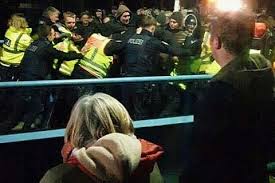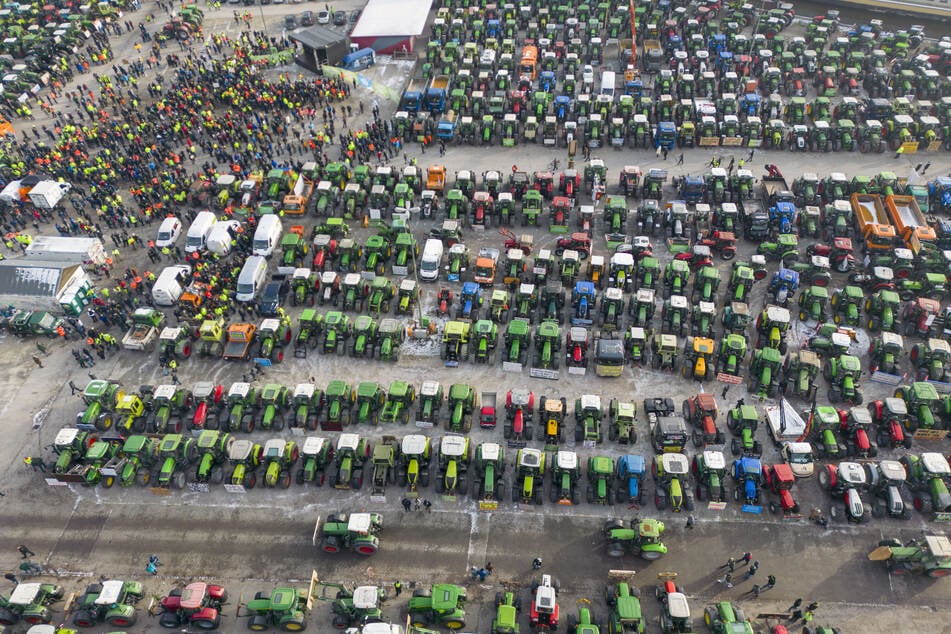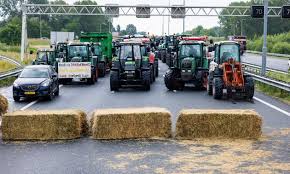In Germany, there is currently a large wave of mass protests by farmers across the country. The reason for the protests is the government's planned cuts in the current budget on the backs of the people, which is currently affecting the peasents in particular. They have been resisting this and have blocked numerous highways and traffic junctions throughout the country in recent days.
The basic situation is that the so called traffic light government under the leadership of Cum-Ex Mafiosi Olaf Scholz has tried to cheat the debt brake and solve the economic crisis of German imperialism by developing state capitalism. That plan was a clear breach of the constitution and therefore an illegal undertaking, which fits in perfectly with the background of the current head of government. However, the undertaking of the goverment failed miserably whats resulting in a sudden hole in the budget worth billions. Now the criminals in the government are trying to close this hole by making cuts at the expense of the people.
A number of these cuts hit the farmers in this country particularly hard. A total of 935 million euros were originally to be saved through cuts in the agricultural sector. For example, the tax exemption for vehicles used in agriculture and forestry was to be abolished, which would save the government 935 million euros. A further 450 million euros were also to be saved by abolishing tax concessions for agricultural diesel. There was resistance to this from the farming community, which did not simply accept these attacks on itself in silence.
It must first be said that the peasantry in an imperialist country like Germany, which is already relatively weak in terms of numbers, differs greatly from the peasantry in the oppressed nations and their situation cannot be equated. Nevertheless, there are also major differences between the various farmers in this country. A large farmer in Germany, for example, has very different conditions to a small farmer. They are all under pressure from agricultural companies, food wholesalers and the government's planned cuts, but the way in which this pressure affects the various farmers is completely different. Although the planned cuts are annoying for large farmers, they are no reason to fear for their existence. For many small and some medium-sized farmers, however, the situation is different. They see the cuts as a real threat to their economic existence, which for them would mean the end of their agricultural livelihood and a slide into the ranks of the proletariat.
However, the farmers are resolutely defending themselves against these attacks by the government. Large protests of farmers took place all over the country, involving tenthousands of farmers. One highlight, which was many reported in the media, was when a crowd of hundreds of angry farmers broke through a line of police while trying to storm an arriving ferry carrying the Minister for Economic Affairs, Robert Habeck. The ferry was able to leave at the last moment, just before the farmers would have stormed it, and Habeck had to return with it.

Farmers storm the ship on which Habeck is. Source:Capital
In the aftermath, there was a storm of indignation from the ranks of politicians. Foreign Minister Annalena Baerbock, for example, described the incident as a "democratic boundary" that had been "crossed". Agriculture Minister Cem Özdemir called the situation unacceptable. He said of the resisting farmers: "These are people who are not interested in German agriculture" and went on to say that they had "wet dreams of overthrowing", which in his opinion would not happen. Gangster Chancellor Scholz also commented and spoke of the "brutalization of political mores" and said that he found the incident "shameful". Interior Minister Nancy Faeser also picked up on the incident, claiming that the farmers' protest was being infiltrated by "extremists". Politicians from the opposition conservative CDU also sided with the government. The Minister President of Schleswig-Holstein, Daniel Günther, simply described the farmers as "chaotic". The Schleswig Holstein state association of the Left Party, which actually tries to present itself as alternative and haggle for the support of parts of the autonomous and anti-fascist movement, also distanced itself from the farmers' violence "in the strongest possible terms" and called it an "unbelievable overstepping of boundaries".
On the whole, it is clear that the many different politicians are, in short, simply afraid of the justified anger of the people, as they (quite rightly) fear that they themselves will one day be hit by it. In addition to the politicians, however, representatives of the German Farmers' Association also distanced themselves and described the blockade of the ferry as a "no go". This also shows the difference between the wealthy large farmers in the leadership of the German Farmers' Association, who distance themselves from the supposedly evil violence against politicians, and the small farmers, who now see their livelihoods threatened and have every reason to be angry with the politicians responsible and to follow this up with actions.
Due to increasing protests from the farming community, the government was forced to take a step back and withdraw some of the planned cuts. Accordingly, there will be no abolition of the vehicle tax for agriculture after all.However, the government is still sticking to the abolition of subsidies for agricultural diesel. However, this is not to be abolished completely from one day to the next, but gradually with ever-increasing cuts. This year, for example, 40 percent of the agricultural diesel tax relief rate is to be abolished. In the coming years, a further 30 percent per year is then to be abolished in 2025 and 2026, so that in two years' time there will no longer be any subsidies for agricultural diesel. A cheap sleight of hand to appease the angry farmers and slowly get them used to the fact that they will feel the full impact of the cuts in two years' time. For the farmers, who have been under increasing pressure for years anyway, the announced reversal of the cuts is just a drop in the ocean and they would be right not to fall for the government's tricks.
As a result, the farmers announced further protests. The German Farmers' Association has thus announced a nationwide week of protests for this week, which began on Monday.The demands being made are nothing less than the complete reversal of the cuts to agricultural diesel subsidies.The farmers are emphasizing these demands with tractor demonstrations throughout the country, but also with blockades of freeway entrances and traffic junctions. On Monday, for example, the whole of Bremen was shut down by farmers blocking every highway entrance to the city. Numerous blockades took place today, especially in Brandenburg. Tomorrow there will be a lot of blockades around Augsburg. In all other parts of Germany, numerous highway entrances were and are also being blocked. The farmers also carried out targeted blockades against important industrial infrastructure. For example, the VW plant in Emden had to shut down on Monday and stop production completely for the day, as all entrances to the plant were blocked by the farmers, making it impossible for trucks to get to the plant to deliver or remove goods. The week of protests is set to end next Monday with a large demonstration in Berlin.

A hanging trafic light: Source: T-online

Protest in Augsburg. Source: Tag24
In general, farmers have been very active in the protests. Exactly how many farmers have taken part in the protests is difficult to say at the moment. However, the numbers appear to be in the tens of thousands, if not hundreds of thousands. According to Tagesschau, around 25,000 vehicles took part alone in the protests in Baden Württemberg on Monday. In the small town of Oldenburg, a whole 5,000 farmers are said to have taken part in these activities on the same day, according to Taz. As already mentioned, farmers' actions have been taking place all over the country. Small farmers in particular are in a situation where they are currently forced to take to the streets and resist the government's austerity plans if they want to continue to exist as farmers in the future. This is one reason for the large turnout of farmers and also for the anger at the politicians, which can also be clearly seen in the protest actions. There were also other smaller acts of resistance during the protest days. On the A24 near Düshorn on Tuesday, farmers unloaded bales of hay on the road and set fire to them, whereupon the police initiated investigations. The same happened on the B105 near Steinhausen. Farmers also carried a gallows with a string at various locations, from which a traffic light was symbolically hung for the government.
As the farmers' protest, including the traffic blockades, currently coincides with the nationwide rail strike called by the GDL on Tuesday, a large part of the infrastructure for the transportation of people, but above all goods and merchandise, is actually at a standstill, which is indeed disturbing the German imperialists. The statements made by politicians in the bourgeois press read accordingly. Admittedly, they make every effort not to further antagonize the farmers and praise the "important role" that the farmers play in this country in every interview and emphasize the importance of "appreciation" for the farmers. At the same time, however, it is always emphasized that the protests must not be too radical and that the farmers' anger must be kept within limits. the german federal president Steinmeier, for example, commented on the farmers' actions with the words "Anger is not a good advisor in a democracy" and warned that the political culture at demonstrations and protests was becoming increasingly coarse and that democrats should think carefully about who they take to the streets with and where the rules of democracy are being violated.True to the motto, demonstrate as petitioners but stick to the rules of this system and continue to trust the government
Other parties, such as the opposition CDU, are trying to take advantage of the farmers' protests and are apparently taking the farmers' side and pledging their support. Absurd. After all, in the years before the Ampel, it was their policies that strangled the farmers further and further. Reactionary and fascist forces such as the AfD, Free Saxony, the Third Way and so on are also trying to mingle with the protests and use them to their own advantage.
As is so often the case with large mass protests, these forces are trying to channel the anger of the masses in their own interests into channels that are conform to the system and do not represent a break with the prevailing conditions.This is then taken up by the ruling politicians who assume that the protests are infiltrated by "right-wing extremists". Even if the politicians in power are currently still holding back and not arguing quite as strongly against the farmers' protests as they did during the coronavirus demonstrations, they are still heading in the same direction. Parts of the petty-bourgeois anti-fascist movement are once again jumping on the train, distancing themselves from the alleged "right-wing revolt" and once again acting as henchmen for the government.
Ultimately, the situation surrounding the farmers' protests once again demonstrates the crisis in which German imperialism finds itself. On the one hand, there is the economic crisis, because the predicted economic prospects for the German bourgeoisie are grim. They are trying to cope with this economic crisis by making cuts at the expense of the people, which in turn intensifies the omnipresent political crisis, with more and more people who distrusting the government and losing their hopes in this system. The anger of the people is growing.
More and more people who have been able to lead a comfortable life within the framework of this system are finding themselves exposed to increasingly harsh attacks by the ruling class and are being pushed more and more to resist, as can be clearly seen in the case of the farmers. In this case, too, the rebellion against the attacks of the bourgeoisie is justified.











